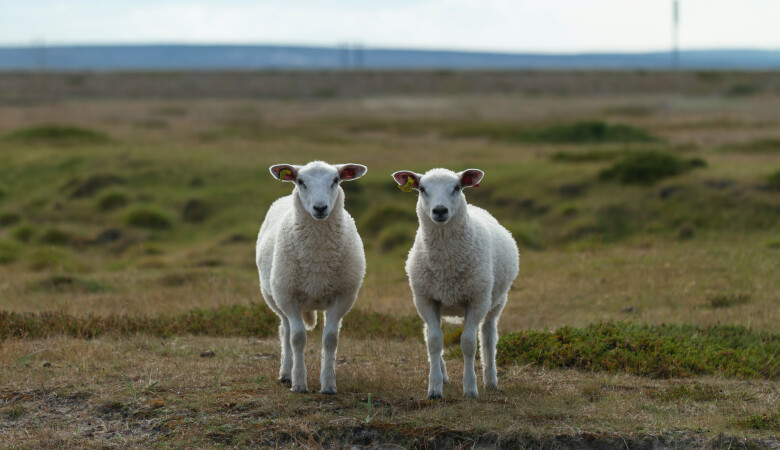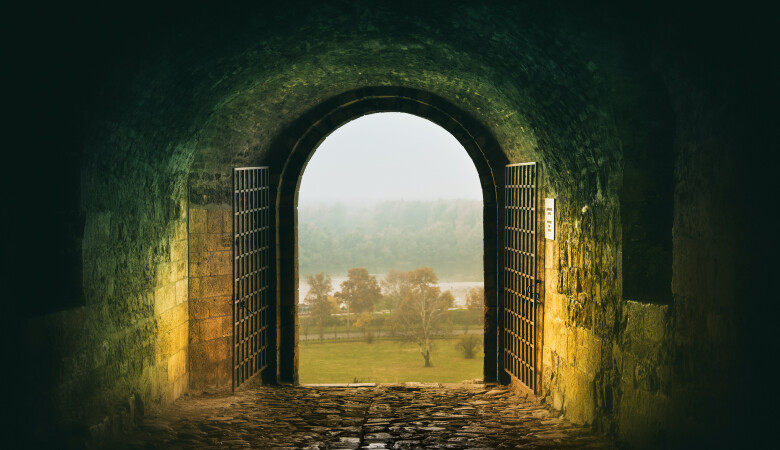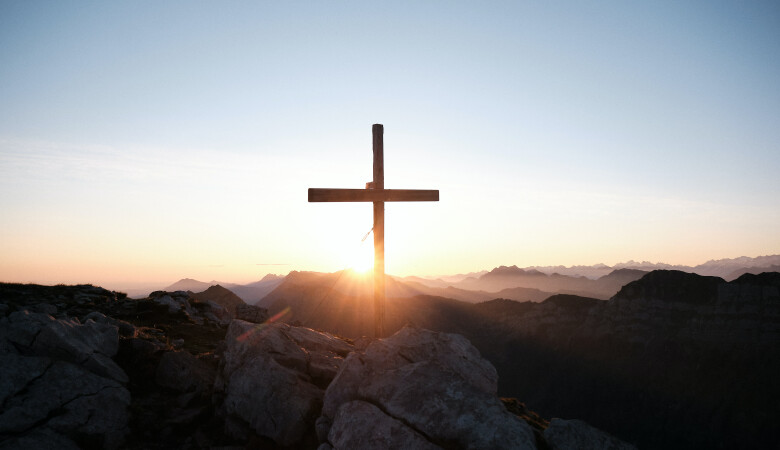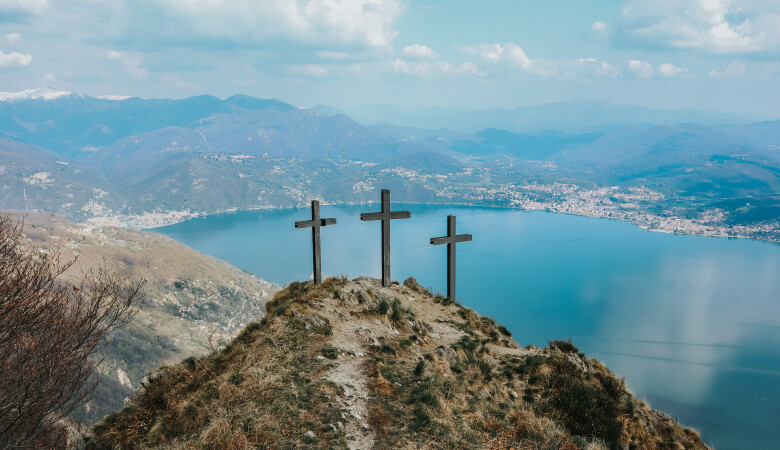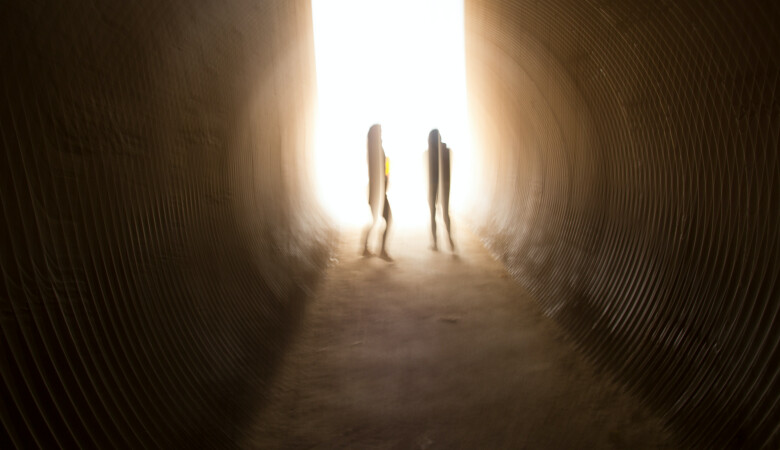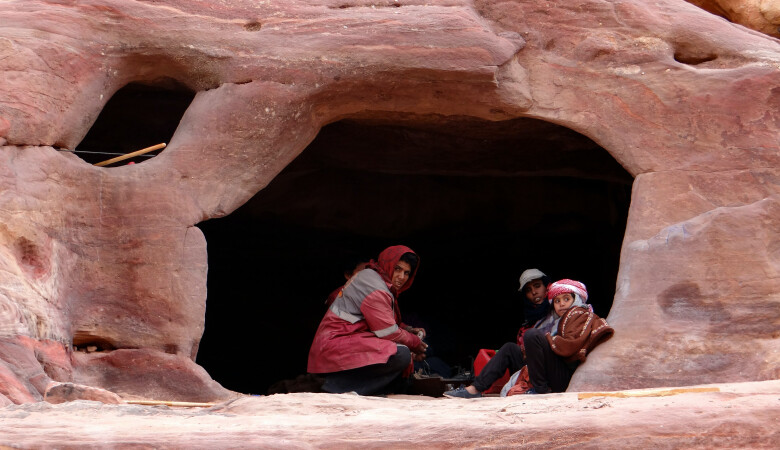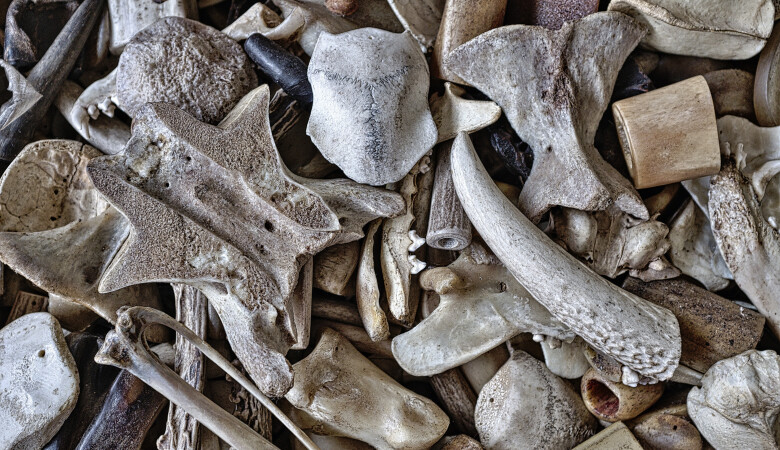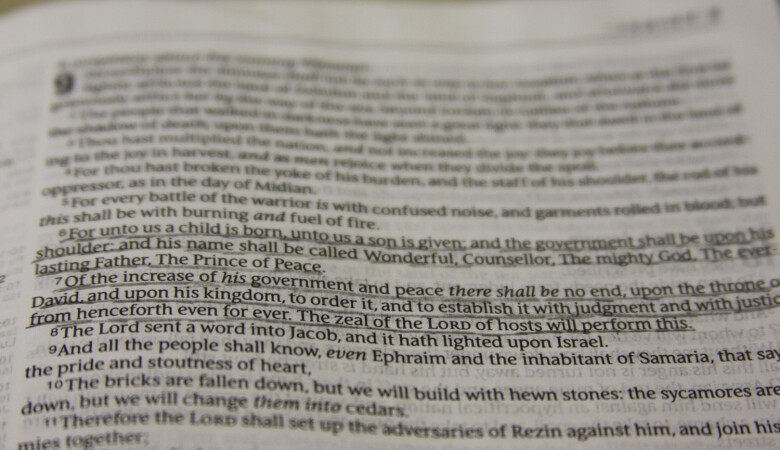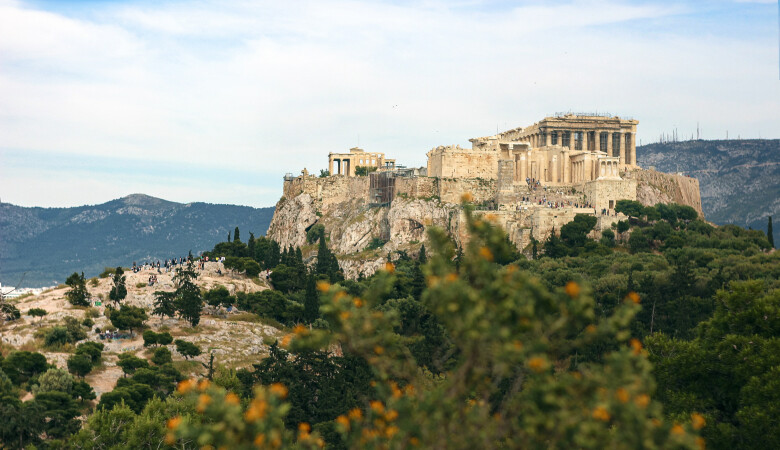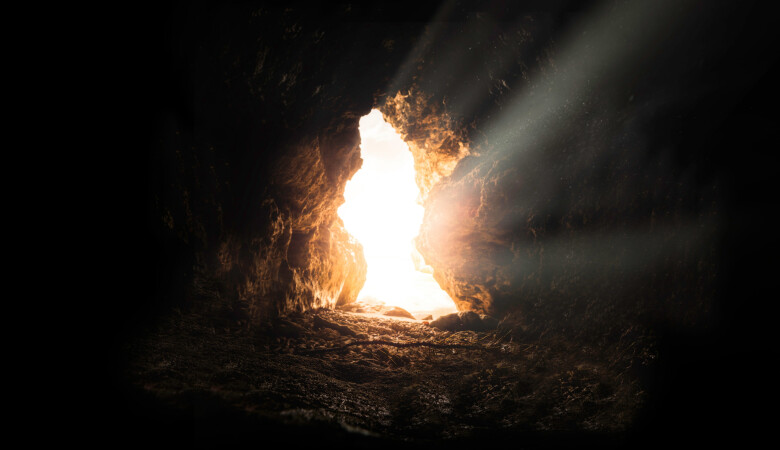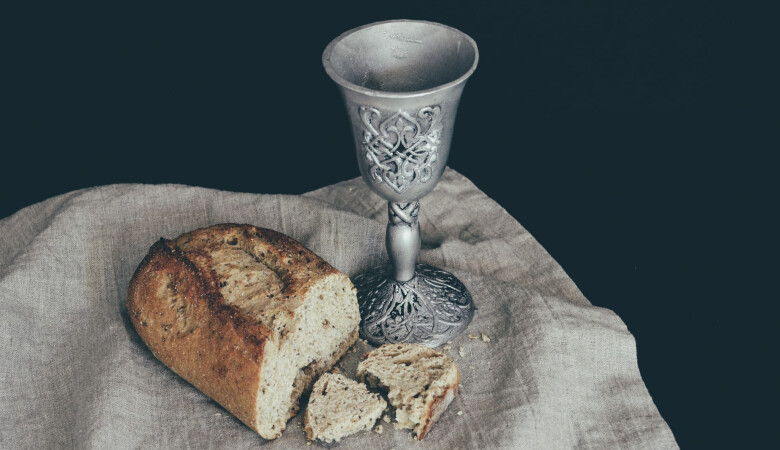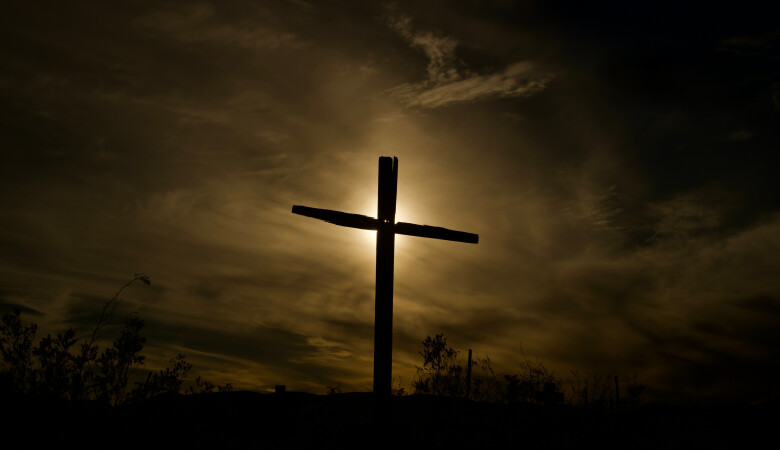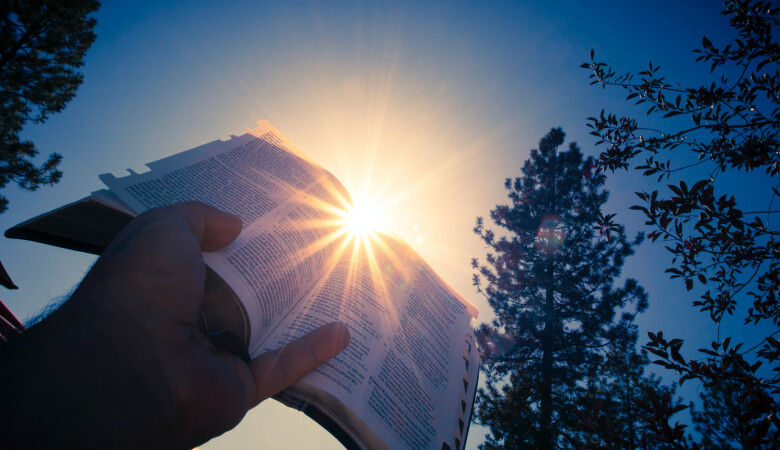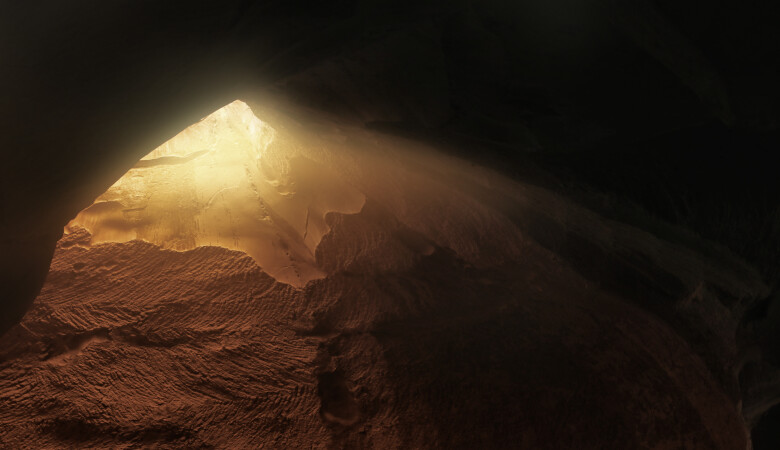The Lamb on the Cross Has Become the Lion on the Throne (2)
April 08, 2007 | Andy Davis
Revelation 5:1-14
Resurrection of Christ
sermon transcript
Introduction
Ordinarily on Easter Sunday, I like to somewhat put the people who are listening to me on a time machine and go back to that first resurrection day. I like to go to narratives that describe what it was like on that day, what it would have been like to go with the women as they went to dress the dead body of Jesus, worried about who's gonna move the stone, and to see the look on their faces when the stone's already removed and the angel gave the message: “He is risen. Why are you looking for the living among the dead? He's not here.” And just to be there and experience it, that would have been something.
Or to be with Peter and John as they heard the news and they ran toward the empty tomb, and they saw the physical evidence of the resurrection, the grave clothes laying there, perhaps in a cocoon, in the shape of the body of Jesus, the head covering folded up neatly off to the side, the stone, the massive stone removed from the entrance by a supernatural force, the whole scene just proclaiming he is risen from the dead. Oh just to be there and see the physical artifacts, that would have been something.
Or to be with the disciples on the road to Emmaus, wouldn't that have been something? Best of all, those personal encounters with the risen Lord. To be able to have a conversation with Jesus, they didn't even know it was him. And their hearts are burning as they hear the word of God from Jesus's own lips. And it's only when they sit down at table with Jesus and he breaks the bread, that their eyes are opened, and they realize that it's Christ, and instantly he's taken away from them. Just to sit with those two disciples, let's make it three disciples or five, and just be able to see the risen Lord, I would love to be able to do that
And so that's how I like to preach usually on Easter Sunday, because I believe with all my heart, it really happened in space and time. There was a time, there was a body, there was an empty tomb, there were eyewitnesses. It all happened. He has risen. It actually occurred. And it's so important for us to realize that that is the truth, and that our faith is established on the unshakable fact of the empty tomb of the resurrection of Christ.
So I like to do that on Easter Sunday. But this morning, I feel led to take you on a different journey, perhaps one of the most incredible journeys that any prophet has ever taken. The Apostle John in exile on the Island of Patmos, having a vision on the Lord's day of the resurrected Christ in his glory, in a way they didn't see him while he ministered on earth, and to hear his voice like the sound of rushing waters, great power.
And then in Revelation 4, he sees a door standing open in heaven, and a command that it's absolutely impossible for us unaided by supernatural power to obey, but John got the command, “Come up here and I will show you what must take place after this,” and at once, John says, “I was in the Spirit, and there before me was a throne in heaven with someone sitting on it.” That's the center of my life. That's the center of my theology, a heavenly throne and someone sitting on it. That is the Ancient of Days. That is the Almighty Heavenly Father. He's sitting on the throne. He is the God of creation in Revelation 4, and there are 24 elders surrounding that throne, and they are continually giving praise and glory and honor to the God who created all things. Revelation 4, the picture of God the Creator, the king sitting on the throne.
I wanna take you, not back in time therefore, but somewhat outside of time, and also mystically and prophetically ahead in time to the future. Outside of time and ahead of time, to see not what Jesus looked like the morning he was raised, but what he will look like when we see him in heaven, when he will be glorified before our very eyes, and we get to worship him for eternity. Because even then there was still work to be done, even that first resurrection morning, there's still a journey to be traveled. There's Mary holding on to his feet, and Jesus has to say, “Let go of me, for I have not yet returned to the Father. There's still some work to be done here.” But how about when there's no more work to be done? How about when Jesus is in his glory, when he's on the throne, and we get to be with him, with a countless multitude from every tribe and language and people and nation around the throne, giving glory and praise to Christ? How about then? Oh, how my heart yearns for that day. And I look forward to it. And this resurrection morning, the first one, that was just the most important step in a long journey that will be fulfilled for all of us by the power of the Spirit.
So let's go outside of time, let's go ahead of time, and let's see in Revelation Chapter 5, a picture of the resurrected and glorified Christ in prophetic perspective, a picture of Jesus on his throne. Four things focused our attention in this chapter. There is a scroll in the hand of Almighty God. Secondly, there is a proclamation by the angel about the scroll. Thirdly, there is a lamb receiving the scroll, and fourthly, there is honor and glory given by all creation to the lamb who receives the scroll. That's the four-part outline of this chapter, Revelation chapter 5.
The Scroll: God’s Plan for Redemption and Judgment for the Earth
The Scroll Described
Let's begin with the scroll. It says in verse one, “Then I saw in the right hand of him who sat on the throne, a scroll with writing on both sides and sealed with seven seals.” That is the scroll described. The Greek word is “biblos,” could be just a book, but it's probably a scroll, rolled up.
And it's in the right hand of someone who's sitting on a throne. The one sitting on the throne is none other than God Almighty, the God who created heaven and earth. And so he sits on his throne in heavenly glory, and in his right hand there is this scroll. And the scroll must be a very precious thing indeed, for it's in the right hand of God, and it is the focal point of all heaven at that moment. All of heaven is focused on that scroll. It must be a very precious thing indeed to be in the right hand of God.
The Scroll Interpreted
And it says that there's writing on both sides. We don't know how John could know this, but he knew it, just like you know something in a dream, you just know. And there's writing on both sides of the scroll. This implies that it's a complete and total record of full accounts, nothing more can be added, and because it is the writing of God, nothing can be removed. It is a perfect writing, perfectly complete. No room to add to it, and nothing can be taken away from it. This must be, therefore, the redemptive plan of Almighty God, culminating in the ownership of heaven and earth, the title deed of the universe with the plan to get there, it is the redemptive plan of Almighty God.
And it says that it's sealed with seven seals. Seal implies ownership and authority. It forbids anyone to break open the scroll and look inside if they don't have that right. There's a sense of punishment to any that break open the seal if they're not worthy to do it. Now, the seven seals, the number seven in the Book of Revelation is a mystical number, signifying deity, signifying the actions of God. It's a complete sealing of the scroll, and what's inside is a complete mystery. And so it's completely sealed. No one can pry up a corner and look inside, get a little glimpse. It's impossible. It's completely sealed.
And based on what happens in Revelation 6 through 8, when the seven seals are opened, the scroll, in my opinion, is probably progressively sealed, rolled up a little and sealed, rolled up a little more and sealed again, rolled up a little more until it is sealed seven times. And so as you break open one of the seals, a little more is revealed. And so it unfolds. Now, this scroll, as I've said, is the eternal plan for the redemption of heaven and earth. It is, as some commentators have called it, the title deed of the earth.
And as the seals are broken, this plan is unfolded before us in the Book of Revelation. And thus it is with God's sovereign plan written in his hand before the foundation of the world, it remains in the mind of God a secret until he chooses to reveal it. And so it says in Deuteronomy 29:29, “The secret things belong to the Lord our God, but the things revealed belong to us and to our children forever.” And so here is a secret thing in the right hand of God.
The Angel’s Proclamation: Who is Worthy?
The Nature of the Proclamation
Secondly, we notice the angel's proclamation concerning the scroll. Look at verse two, “And I saw a mighty angel proclaiming in a loud voice, ‘Who is worthy to break the seals and open the scroll?’” Look at the nature of the proclamation. The task is entrusted not just to any angel, but to a mighty angel. Now, to us mortals, to us weak people, any angel is a mighty angel, but this must be a truly mighty being, to be entrusted with this job of proclaiming. He is a mighty and a powerful angel, perhaps more powerful than other angels. The proclamation is made with a loud voice so that it can be heard across all of creation. And the proclamation is a question, and the question rings out over all of time in history, “Who is worthy? Who is worthy?”
In one version of the legend of King Arthur, there's a story of Excalibur, the sword, and it's stuck in an anvil, which is in a boulder, in a stone, a sword in a stone, and there's inscribed on it, “Who so pulleth out this sword of this stone and anvil, is right-wise born king of all England.” You know the story, how Sir Kay is going to a jousting tournament, he has a little squire named Arthur, and Arthur is forgetful, he'll do better when he's a king later, but he forgot his knight's sword. That's pretty big. You're going to lose any jousting when you don't have your sword. Because when you're both de-horsed and you're standing there with nothing in your hands, you lose.
So he's in trouble, he needs a sword, Arthur realizes he's in big trouble. He happened to notice, strangely, a sword sticking out of a stone. Goes out, pulls it out without any trouble and brings it into Sir Kay who recognizes it immediately. That's the sword that was in the stone. He said, “Where'd you get this?” He said, “It was just outside. It was in a stone somewhere. I don't know why it was there, but there it was.” Sir Kay is amazed. They go out, they put it back in, and Sir Kay is not able to pull the sword from the stone, neither is anyone else. Arthur does it easily and repeatedly. And thus it is identified that he is right-wise born king of all England. Now, that's a myth. It's a legend. It almost certainly never happened.
This is no myth, friends. This is no legend. Whoever has the right to take this scroll from the right hand of Almighty God is right-wise born king of all creation. And the question is, who is worthy to do it? Who has the right to take it from the right hand of God? That's the question.
The Purposes of the Proclamation
Now, there are many purposes for the mighty angel's proclamation. First of all, to display the greatness of the task of taking the scroll, breaking open its seals and opening it, it is a great task, and not everyone is worthy to do this task. The taking of the scroll from the right hand of him who sits on the throne implies the right to rule heaven and earth. The opening of the scroll seal by seal implies the right to govern the development of God's redemptive plan. Under whose hand can this plan develop? The one who can break open the seals and open it. The rights and privileges of taking the scroll and opening it are greatly dramatized by the pomp and circumstance of this cry by the angel: “Who is worthy?”
Secondly, the proclamation also displays very vividly the disqualification of all the rest of creation, of all of creation, disqualified. Look at verse three, “But no one in heaven or on earth, or under the earth could open the scroll or even look inside it.” Friends, this involves every single human being that has ever lived. All the mightiest emperors, from Alexander the Great through Caesar and Genghis Khan, Napoleon, right on through, none of them are worthy to take the scroll from the right hand of him who sat on the throne. All the wisest philosophers, whether Socrates or Plato or Aristotle, or Descartes, right on through, none of them are wise enough, none of them are worthy to take the scroll. All of the greatest scientists and inventors, whether Archimedes or Pythagoras or Einstein, Edison, none of them are worthy to take the scroll and look inside.
Even the humble unknowns, the humble servants, the ones that no one knows their name, the ones that have lived a life of love and service to their fellow men, all of them are disqualified. Not one of them is worthy. Whether famous or non-famous, none of them are worthy. Even among the godliest believers of the Bible, whether Abel or Enoch or Job, or Abraham, Isaac or Jacob, whether King David or Solomon, right on through the prophets, Isaiah, Jeremiah, Daniel, Ezekiel, none of the Apostles of the Lamb, none of the great figures of church history, it didn't matter. Even the martyrs who shed their blood to advance the gospel of Jesus Christ, those that died in the coliseum in Rome, mauled by lions, or the reformers, they're all of them disqualified, every last one. Even John himself who gave us this book, the apocalypse, the Book of Revelation, he would not dare cross that space and go forward to the throne of God and take from his right hand the scroll. He wouldn't dare do it.
Let me get really personal. You are disqualified. I am disqualified. We're not worthy, not one of us. And why is it? For all have sinned and fall short of the glory of God. We're all sinners, every last one of us. We have, all of us, this in common, and we are disqualified from taking the scroll. But we can go beyond that. All of the angels, holy as they are, who have never sinned, who have only obeyed God, even the mighty angel who's doing the proclaiming, the angels are all disqualified, all of them, because this must go to the Son of Man, who is the Son of God, and none of them are the Son of Man. They're all disqualified.
So the angel's proclamation heightens the sense of anticipation and also of grief. Look at verse four, “I wept and wept,” said John, “Because no one was found who was worthy to open the scroll or look inside.” John is reacting, “Is there no one? Is there no one who can take the scroll?” And he weeps and weeps. And the proclamation therefore displays the greatness of Jesus Christ, does it not? Then there's a dramatic pause, and everyone that has ever lived is disqualified, and all of the holy angels and the 24 elders and the living creatures, all of them disqualified. And then up steps Jesus, the Lion of the tribe of Judah, and he has the right to do it. Does this not display the greatness of Jesus Christ? Isn't that the purpose of the proclamation?
Look at verse five, “Then one of the elders said to me, do not weep, behold the lion of the tribe of Judah. The root of David has triumphed. He is able to open the scroll and its seven seals.” He is able, he is able to take the scroll, he's able to break open its seals, he is able to govern history, 20 centuries of it and more, he is able to do it, and he is able to save your soul and mine. He is able to save us. And he is able to hold our attention for all eternity, so that we will be worshipping him forever and ever. As new waves of revelation come and we learn more and more about our great Savior, he is able to take the scroll and open its seals. And so we see this lion who has triumphed, victorious lion.
A Lamb on the Cross
The Lamb Predestined
You think he would have some great appearance, some dreadful and terrifying appearance, but instead, he looks and he sees a lamb looking as if it had been slain. And so we have this vision of the Lion who is the Lamb, the Lion of the tribe of Judah, the Lamb looking as if it had been slain. This is the Lamb who is Jesus Christ. John's conquering hero throughout the Book of Revelation is a Lamb, and he's a Lamb still now. But first and foremost, he was a Lamb on the cross. This was God's plan. It was his purpose that his Son should become an atoning sacrifice for our sins, and this plan was made before the foundation of the world. God didn't make this up as he went along. He didn't have a good idea one day and come up with it. It wasn't like that. It's an astonishing thing about God, is that he has never learned a single thing, and he never will. Meditate on that. Doesn't that trip your breakers? He's never learned a single thing and he never will. Never been a new idea for God, never.
And so he is the lamb predestined before the foundation of the world to die on the cross. Revelation 13:8 says, “He was the Lamb that was slain from the creation of the world.” Jesus Christ was chosen before the foundation of the world to die on the cross for the sins of men and women and boys and girls. This plan was worked out before God said, “Let there be light,” this was a predestined, planned.
The Lamb Predicted
Secondly, he was the Lamb who was predicted. God didn't just work out the plan, he told us about it ahead of time, so that when it happened, we could see that he had told us ahead of time. This is something only God can do. We don't know what's gonna happen next week. We really don't. It's really humorous to me that the workers work so hard to get the air conditioner fixed so that we could be nice and cool this morning. Isn't that wonderful? I just think that's great. Are you cool enough? Maybe we can open some windows for you. What was it, 35 degrees this morning? We don't even know the weather, we don't know what it's gonna be like in a week. God predicted Christ thousands of years before he was born. He predicted it. And said what would happen. He is the Lamb predicted.
And so we have this idea of the lion of the tribe of Judah. Genesis 49 gives us the prophecy, it says, “Judah is a lion's cub; from the prey, my son you have gone up. He stooped down, he crouched as a lion and as a lioness, who dares to rouse him? The scepter shall not depart from Judah, nor the ruler's staff from between his feet until tribute comes to him, and to him shall be the obedience of the peoples.” This is about 18 centuries before Jesus was born, spoken by Jacob to his son, a prophecy of Jesus.
So he's the Lion of the tribe of Judah. He's also predicted to be the root of David, that was in the mouth of Jeremiah the prophet, about six centuries before Jesus was born. Jeremiah 23:5 and 6, “‘The days are coming,’ declares the Lord, ‘when I'll raise up to David a righteous branch, a king who will reign wisely and do what is just and right in the land. And in his days, Judah will be saved and Israel will live in safety. This is the name by which he will be called: The Lord our righteousness.’” That's Jesus. He is the Lord and he is our righteousness. That's six centuries before Jesus was born, he is the root of David.
God identified him again and again through history, especially through the animal sacrifice. God set up a system of animal sacrifice whereby animals could represent the taking away of sin, and the priest would take his hands and put them on the head of the substitute of the animal, and he would confess onto the substitute the sins of the people. And then the substitute, the animal would die and its blood would be poured out before God on the altar. It was a picture of Jesus Christ. Every single animal sacrifice there has ever been is a prediction of Christ.
The Lamb Presented
He was the lamb predicted. He was also the lamb presented. At the right time, in the fullness of time, God presented him to the world. Born of a virgin, he presented him. He said at his baptism, “This is my beloved son whom I love. With him, I am well pleased.” He presented him. And for 30 years, he lived in relative obscurity until the time came for him to be presented to Israel as the Savior of the world. And that happened when he was baptized by John the Baptist.
John was a prophet sent by God. And one day he saw Jesus coming toward him. And he pointed toward him, and he said, “Behold the Lamb of God who takes away the sin of the world.” That's a presentation. Everyone behold, behold Jesus. He is the Lamb of God who takes away the sin of the world. His death on the cross is God's atoning sacrifice. The only one there is for your sin and mine. There's none other available. Behold the Lamb. God presented him, it says in Romans 3, as a sacrifice of atonement. The one who takes away God's wrath through faith in his name.
The Lamb Punished
He is also the Lamb punished. He's the Lamb punished. Four phrases in our text today speak of that. Look at verse six, “Then I saw a Lamb looking as if it had been slain.” Do you see that? Looking as if he had died, “standing in the center of the throne.” Look at verse nine, “You are worthy to take the scroll and to open its seals because you were slain. And with your blood, you purchased men for God.” Again, in verse 12, “In a loud voice they sang, ‘Worthy is the Lamb who was slain to receive power and wealth and wisdom, and strength, and honor and glory and praise.’” That's four mentions just in these 14 verses.
It's almost as if heaven just can't get over that Jesus died. That he was slain, that he died on the cross, that his blood was shed. It's really quite astonishing. This is the one before whom they hide their faces. He sits on the throne. He is powerful, he is the eternal son of God. What a mystery, Almighty God in physical human flesh, and yet he meekly and weakly submits to death, even death on a cross and does nothing. Does not lift a finger to save himself, though he has all power in his smallest finger. More than any of the potentates that have ever lived. He is omnipotent, incarnate. He could have stopped the crucifixion, but he didn't. It's really quite amazing.
How could he do it? How could he suspend his power so meekly and die so weakly? How could he do it? Why was he punished? Well, he was punished for us. Punished for us. Whenever I read or see depicted in some way the sufferings of Jesus Christ, I have learned to say, “I deserved that.” I did. Because I broke God's law. Because I'm a liar, because I'm a sinner, because I'm not godly, because I've sinned and fall short of the glory of God, I deserved that. And worse, because the Bible speaks of hell, it speaks of a place of eternal torment, and the smoke of their torment rises forever and ever. And there is no rest, day or night for any that do not receive the gospel and believe it.
And I've come to train myself to say I deserve that, I deserve hell, and Jesus came as my substitute, to die in my place to take that away from me and from a countless multitude of people, from every tribe and language and people and nation, and all they need to do is believe. And so the prophecy is given in Isaiah 53, “He was pierced for our transgressions; he was crushed for our iniquities. The punishment that brought us peace was upon him, and by his wounds we are healed. We all like sheep have gone astray. Each of us has turned to his own way, and the Lord has laid on him the iniquity of us all.” The Lamb punished. I saw a Lamb looking as if it had been slain. That was Jesus.
The Lamb Purchased
Well, he is also a lamb who has purchased with his punishment something of great value. Look at verse nine, “And they sang a new song: ‘You are worthy to take the scroll and to open its seals because you were slain, and with your blood you purchased men for God from every tribe and language and people and nation.’” This is the amazing purpose of the lamb's punishment, of his incarnation, of his coming to earth. Jesus had a purpose and it was to buy us back from slavery to sin, so that we would be God's precious possession. That we would be God's. Herein find your self-esteem. I am God's and he is mine forever and ever. Your soul can say that, he has purchased you for God with his own blood. That's his purchase.
And it's not a small number friends, and it's not narrow either, there will be people from all over the world. Herein ends racism and bigotry, and parochialism and focusing on our own little worlds, God is looking at the whole world. And there's gonna be people from all over the world at the throne worshipping Jesus for his purchase. And by his purchase he has made us, it says, “to be a kingdom of priests.” I think that's the best way to understand that we are priests who are kings, and we will reign with him forever and ever. How much did that cost? How expensive was that? Jesus paid it all. That's his purchase.
A Lion on the Throne… But Still a Lamb
The Nature of the Lion
Well, that's how he's a lamb. How is he a Lion? It says, “He's the Lion of the tribe of Judah.” Well, everywhere throughout scripture, lions are portrayed as terrifying foes. It's an amazing thing that Samson is able to rip a young lion to shreds with his bare hands, only the Spirit of God coming upon him can do it. I don't care how big his muscles were, he loses, if the Spirit of God doesn't help him. Because lions are powerful beasts, 700, 800 pounds. Their roar can be heard five miles away. They're pictures of great power, they shrink back from nothing. They are fearless, terrifying, really. Their roar is terrifying. Their claws, their jaws are terrifying. A terrifying enemy is a lion, you don't want one as an enemy. Jesus Christ is called the Lion of the tribe of Judah. Look at verse five, “Then one of the elders said to me, do not weep, behold the lion.” So we have in John chapter 1, in the mouth of John the Baptist, “Behold the Lamb of God who takes away the sin of the world.” Here we have, “Behold the Lion.” And how can they both be true of one individual? They're opposite kind of creatures.
The Triumph of the Lion
But this lion, it says, has triumphed. He has won a great victory. You know what he did? He took that lion-like strength and he ripped to shreds sin and death and the grave, and hallelujah for it. He's a Lion on our behalf, really. I've wondered about this because he's never called Lion again, ever. In the book of Revelation, he's never called Lion again. Isn't that interesting? So the sermon's a bit misnamed, sorry. He is the Lamb on the throne and the Lion on the throne, both at the same time. He's still Lamb
And I meditated on this. Why is it always lamb, lamb, lamb for the rest of the book? We never see lion again. Well, he's already done his lion work for us. When he roared like a Lion, “It is finished!” That's a victor's cry. And he has torn apart enemies we could not face ourselves. And he is the victor, he has won the victory.
The Power of the Lion
And we see the power of the lion in symbolic form, difficult to visualize. So just understand it symbolically and prophetically. It says he had seven horns and seven eyes, which are the seven spirits of God sent forth into all the earth. Seven horns, the horn symbolize strength, kingly power. The number seven, a number of deity, of divinity, of perfection. Perfect power is omnipotence. It says he had seven eyes, the eye is the lamp of the body. With it, we gain information about the world around us. Seven eyes is perfect knowledge, it's omniscience. It says here is “the seven Spirits of God sent out into all the earth. Where can I flee from your Spirit? Where can I go from your presence?" This is a picture of perfect presence by his Spirit. It is omnipresence, omnipotence, omniscience, omnipresence. He is God. He is God, the Lamb is God.
The Position of the Lion
And look at the position of the Lamb on the throne. Quite simply, he stands in the middle of the throne, again, a picture of Christ’s deity. Look at verse six, “Then I saw a lamb looking as if it had been slain, standing in the center of the throne, encircled by the four living creatures and the elders.” Who can share this throne but God himself? Only God can share this throne.
The Lasting Image: Lamb not Lion
Now, why is it for the rest of the book, we never see “Lion” again? Well, you know why? Because I think this book was written for us, it's written for us to read. It's to show his servants what must soon take place. It's for us, for us Christians. For us he's never a Lion. He doesn't treat us like a lion would treat. He is gentle with us. He's tender-hearted. He says, “Come to me all you who are weary and burdened and I will give you rest, for I am gentle and humble in heart.” Those are lamb-like qualities. That's the way he deals with his own. He is always a lamb to us.
He's always terrifyingly a lion to his enemies though. And so you get some anomalies in the book of Revelation, some oddities. Even when Jesus is doing mighty, powerful things against his enemies, he's still called the Lamb. And so it says very interestingly in Revelation 6, “Then the kings of the earth and the princes and the generals, and the rich and the mighty, and every slave, and every free man hid in caves and among the rocks of the mountains. And they called to the mountains and the rocks, ‘Fall on us and hide us from the face of him who sits on the throne and from the wrath of the Lamb.’ For the great day of their wrath has come. And who can stand?”
The wrath of the Lamb is a bit odd. We would understand wrath of the Lion. But for us, he's a Lamb. It's the same one. All I'm saying is that Jesus is a delightful Savior, but he's a terrifying enemy. And oh, that we would not be included among those that are fleeing from him when judgment day comes. That we would be ready to face him unashamed, knowing that his blood was shed for us and toward us, he is gentle and welcoming like a Lamb is.
The Lion/Lamb Is Worthy of Universal and Eternal Worship
Worship: “You Are Worthy…”
The passage ends up with universal worship, isn't it beautiful? The Lion and Lamb is worthy of universal and eternal worship. Verse nine, “And they sang a new song: ‘You are worthy to take the scroll and to open its seals.’” He is worthy of worship. He's the only one in history qualified to take the scroll. He is the only one that died on the cross for our sins. He's the only one that has been raised from the dead on the third day. He is the death conqueror. He is worthy of our worship.
Universal Worship
And it's universal worship, notice, first the living creatures, then the 24 elders, then the 100 million angels, then every created thing in heaven and on earth and in the sea, and all that is in them, universal worship.
Worship Based on Christ’s Accomplishment
And it's also worship based on Christ's accomplishment. Look at verse nine and 10, “You are worthy to take the scroll and to open its seals because” - there's a reason he's worthy. Because he was slain - “because you were slain and with your blood, you purchased men for God from every tribe and language, and people and nation. And you have made them to be a kingdom and priests to serve our God, and they will reign on the earth.”
Eternal Worship
And it is finally eternal worship. Look at verses 13 and 14, “Then I heard every creature in heaven and on earth and under the earth and on the sea, and all that is in them singing, ‘To him who sits on the throne and to the lamb, be praise and honor and glory and power forever and ever.’ The four living creatures said, ‘Amen,’ and the elders fell down and worshipped.”
Application
Come to Christ… Know Him as LAMB so you need not fear Him as LION
Don't you wanna be there? Don't you wanna see it with your own eyes? When judgment day comes, don't you wanna be forgiven for all of your sins by the blood of this lamb that I've talked about today. How did you get here today? Did a friend bring you? I say, the best friend brought you, it was Jesus that brought you. Maybe he used someone to invite you, but God brought you here today to hear this message. Because some day you're going to see this Lion, this Lamb, that he would be for you Lamb and not Lion, that he would be your Savior, that his blood shed on the cross would be full forgiveness for your sins. Do not pretend to say, “I don't need a savior like this. I'm basically a good person.” There are no basically good people. We've all sinned and fallen short of the glory of God, and we need a savior.
Oh, come to Christ. Come to this gentle savior. He is inviting you. As I've already said, “Come to me all you who are weary and burdened, and I will give you rest. Take my yoke upon you and learn from me, for I am gentle and humble in heart, and you will find rest for your souls.” And you'll find more than that, you'll find a door standing open in heaven and a voice will call come up here and I will show you my glory forever and ever, and you will be in the Spirit. And you will see his glory forever and ever. And you will never run out of things to say about Jesus. Come to Christ, worship him today. Trust in him for the forgiveness of your sins, that you might have eternal life. Please close with me in prayer.



